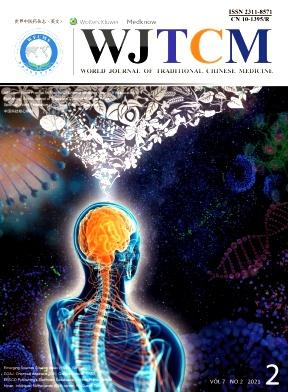The mechanism of total ginseng extracts in the treatment of lung cancer progression based on network pharmacology and experimental validation
IF 4.3
3区 医学
Q1 INTEGRATIVE & COMPLEMENTARY MEDICINE
引用次数: 0
Abstract
Objective: The objective of this study was to investigate the mechanism by which total ginseng extract (TGE) inhibits the progression of lung cancer through network pharmacology and experimentation. Materials and Methods: A Lewis lung carcinomas (LLC) model was established by injecting cancer cells through the tail vein and through administering different doses of TGE. The infiltrated immune cells into the microenvironment of lung cancer metastasis through flow cytometry were evaluated, and the messenger RNA (mRNA) expression levels of various immune cell-related chemokines were determined using quantitative reverse transcription–polymerase chain reaction. Therapeutic targets and signaling pathways of TGE in nonsmall cell lung cancer were investigated using systematic pharmacology and virtual docking. Immunoblotting was performed to determine the impacts of TGE on migration-related proteins. Results: Flow cytometry showed that 1.82 g/kg TGE increased the infiltrated T cells and inhibited the recruitment of myeloid cells, which was caused by decreased mRNA expression of chemokines after TGE treatment. Gene ontology and Kyoto Encyclopedia of Genes and Genomes analyses showed that the delayed progression of lung cancer by TGE might be related to the promotion of lung cancer cell apoptosis-associated signaling pathways. The virtual docking results indicated that the active components of ginseng are directly bound to apoptosis-related proteins. Immunoblotting showed that TGE inhibited tumor metastasis by regulating the expression of migration-related proteins. Conclusions: The study reveals the potential mechanism of ginseng extract in the treatment of lung cancer progression and provides a reliable basis for its clinical application.基于网络药理学和实验验证的人参总提取物治疗肺癌进展的机制
目的:通过网络药理学和实验研究人参总提取物(TGE)抑制肺癌进展的作用机制。材料与方法:采用尾静脉注射癌细胞和不同剂量TGE建立Lewis肺癌(LLC)模型。通过流式细胞术评估浸润免疫细胞进入肺癌转移微环境的情况,并采用定量逆转录-聚合酶链反应检测各种免疫细胞相关趋化因子的信使RNA (mRNA)表达水平。采用系统药理学和虚拟对接的方法研究了TGE在非小细胞肺癌中的治疗靶点和信号通路。免疫印迹法测定TGE对迁移相关蛋白的影响。结果:流式细胞术显示,1.82 g/kg TGE使浸润T细胞增加,抑制髓系细胞募集,这是由于TGE处理后趋化因子mRNA表达降低所致。基因本体论和京都基因与基因组百科分析显示,TGE延缓肺癌进展可能与促进肺癌细胞凋亡相关信号通路有关。虚拟对接结果表明,人参活性成分与凋亡相关蛋白直接结合。免疫印迹显示,TGE通过调节迁移相关蛋白的表达抑制肿瘤转移。结论:本研究揭示了人参提取物治疗肺癌进展的潜在机制,为其临床应用提供了可靠依据。
本文章由计算机程序翻译,如有差异,请以英文原文为准。
求助全文
约1分钟内获得全文
求助全文
来源期刊

World Journal of Traditional Chinese Medicine
Medicine-Complementary and Alternative Medicine
CiteScore
5.40
自引率
2.30%
发文量
259
审稿时长
24 weeks
 求助内容:
求助内容: 应助结果提醒方式:
应助结果提醒方式:


